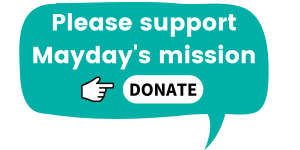Project Fear? I think not…
Cherrytree PTS Coach, Mary Power looks at the importance of power dynamics and real-world conversations when it comes to safeguarding on the frontline.
Safeguarding – it’s everyone’s business and so it should be, but can raising a safeguarding concern alter the relationship you have with the person you are working with? Can it, in fact, actually improve the relationship? For some of us, the word Safeguarding fills us with dread. Maybe, it’s the fear of how to raise the issue with that person or maybe it’s the fear of how they may react? One thing’s for sure, it can’t be brushed under the carpet and this is how it happened when I broached it with Jen, one of the young people I am currently working with.
The unique way an Asset Coach works with individuals means we have a different relationship with the person than traditional services, one difference being the power dynamics. Therefore, when a safeguarding issue comes to light, how we talk to the person about this feels different and doesn’t need to be feared. This is how I felt when I was working with Jen, who I have been working with for around 6 months.
My initial “fear” was that if I mentioned safeguarding to her (which I had to do, let’s be clear about that!), my relationship with Jen might change, or worst-case scenario, might end. How wrong I was…….. Okay, let’s be honest – the conversation wasn’t easy as they never are, but I had that difficult chat because I felt that I owed it to her to be honest about the issue. I talked to her about how I needed to contact the professional who would be able to help and support her in making safe decisions around her children. Jen was a bit unsure and talked to me about how she hated that professional and she only trusted me. I explained I wasn’t a health/medical expert and I felt she would benefit, as we all do sometimes, from their expert advice. I told Jen I had sought advice from Health Visitors when my children were younger. Jen seemed a little bit defensive, but once again said she trusted me and the conversation was left that the said professional would visit her the week after. I kept Jen in the loop and rang her back once I had contacted the professional to confirm the appointment. The week after my phone call and in fact, the day after the professional was due to visit Jen she called me, unprompted —
“Mary, I am so glad you contacted the health visitor, they gave me some advice that I needed” and so the conversation went on in a very positive manner about her children and what advice the health professional gave her, and ended with, “Mary, can we meet up next week at the play centre?”
My point is, authentic relationships should be based on trust. If trust and authenticity is there, difficult conversations can be had without those relationships necessarily breaking down. So, Project Fear it is not, embrace those real world conversations and don’t be afraid of them. Safeguarding has to be everyone’s business so embrace it, don’t shy away from it. By having a real world relationship with Jen I was able to have, albeit a difficult, but honest conversation with her. Because in the real world we all occasionally have to have difficult conversations with each other, but if the trust is there, a relationship can be preserved in the long run and even improved.
Please note names have been changed.


